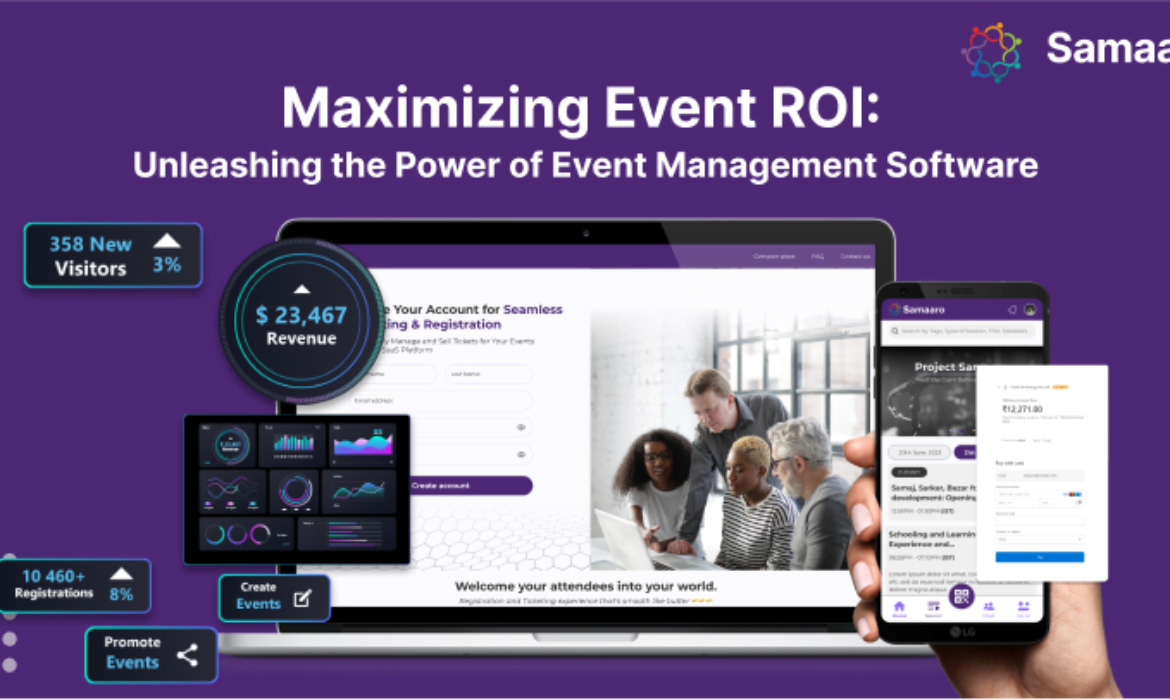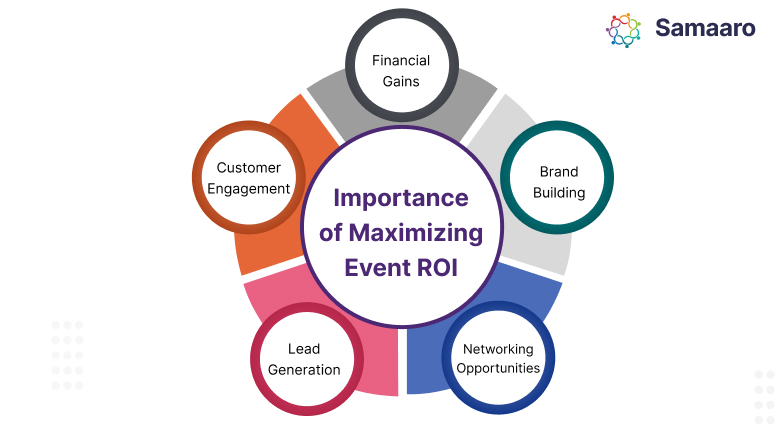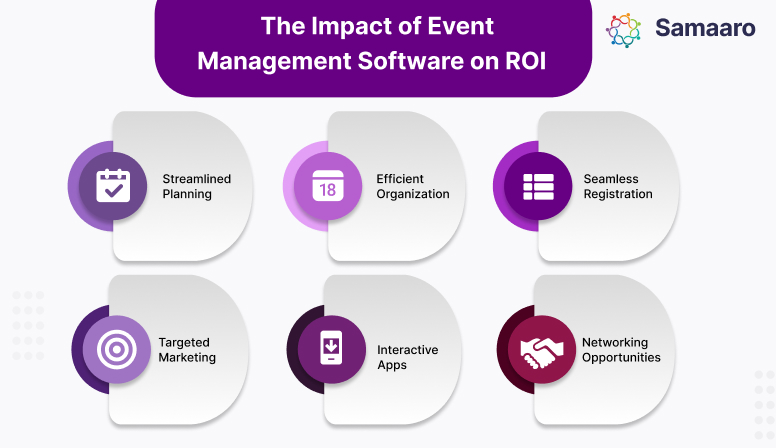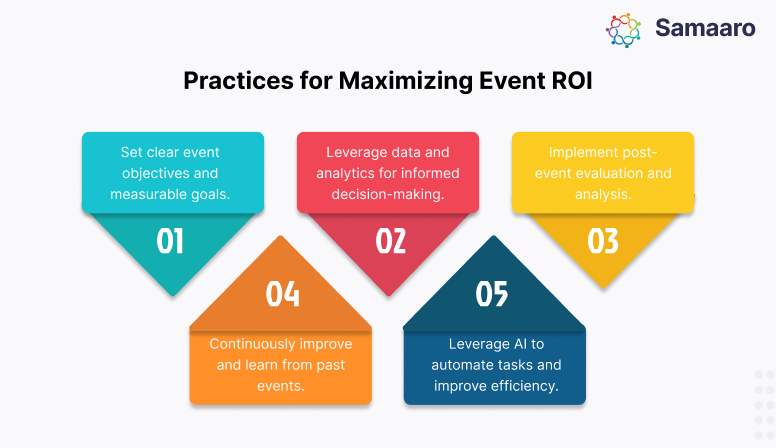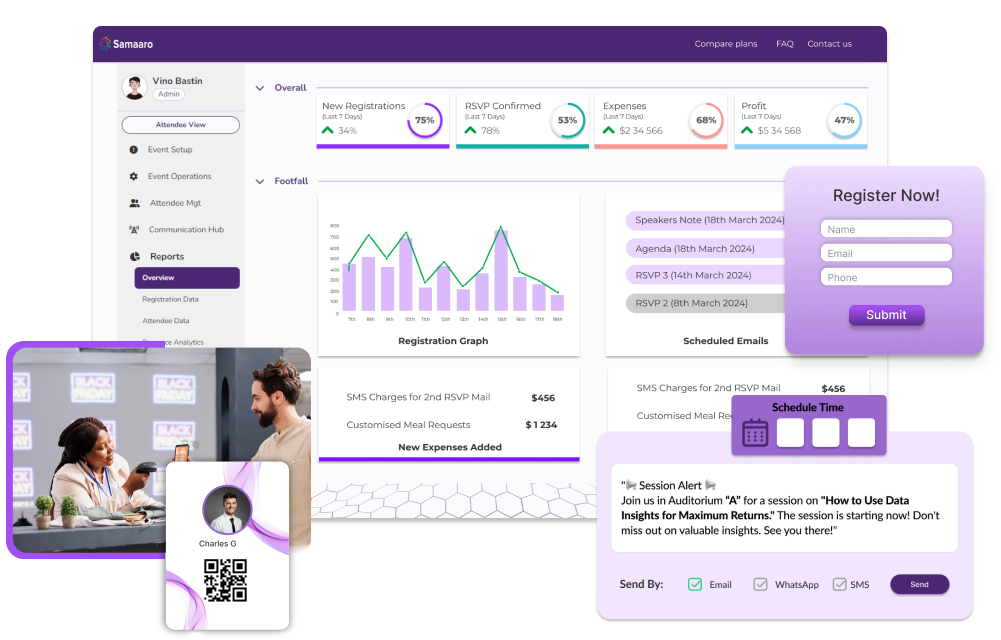In today’s competitive business landscape, organizing successful events is crucial for companies to achieve their goals. Whether it’s a corporate conference, trade show, product launch, or a marketing event, the importance of maximizing Event Return on Investment (ROI) cannot be overstated. Every event represents a significant financial and resource investment, and understanding how to drive success is paramount to reap the desired benefits.
Importance Of Maximizing Event Return on Investment (ROI)
Event ROI goes beyond just financial gains. While generating revenue and increasing profits are essential, successful events also play a crucial role in brand building, networking opportunities, lead generation, and customer engagement. By maximizing event ROI, organizations can harness the full potential of these opportunities, leading to long-term business growth and a competitive edge in the market.
Factors that Contribute to Event ROI
Several factors contribute to the overall success of an event and its ROI. These may include:
- Clear Objectives: Establishing clear and measurable objectives before planning an event is fundamental. Whether it’s to increase sales, enhance brand awareness, or launch a new product, defining goals helps align all event-related activities towards a common purpose.
- Efficient Planning and Execution: Thorough event planning and flawless execution are vital. From selecting the right venue and managing logistics to curating engaging content and securing prominent speakers or exhibitors, every aspect requires attention to detail.
- Audience Engagement: Engaging the target audience before, during, and after the event enhances the overall experience and builds lasting connections. Utilizing innovative technologies and interactive activities can significantly impact attendee satisfaction.
- Cost Management: Maximizing ROI involves optimizing costs without compromising on the quality and impact of the event. Smart budget allocation and negotiation with vendors are essential to ensure resources are well-utilized.
Challenges in Measuring Event ROI
Measuring event ROI can be complex due to various intangible elements associated with events. Some challenges include:
- Attribution: Determining which aspects of an event directly contributed to specific outcomes can be challenging. For example, identifying the impact of networking opportunities or individual sessions on lead generation can be elusive.
- Data Collection: Gathering accurate data on attendee behavior, post-event actions, and overall event success can be cumbersome without the right tools and technologies.
- Timeframe: Event ROI may not be immediately apparent, as some benefits may materialize over the long term. This delayed impact makes it difficult to assess the event’s immediate success.
This is where event management software plays a pivotal role. By leveraging technology to streamline event planning, execution, and analysis, organizers can overcome many of these challenges and maximize ROI effectively.
The Impact of Event Management Software on ROI
Event management software plays a pivotal role in driving the success of events and maximizing ROI. It provides a comprehensive set of tools and features that streamline the planning, organization, marketing, and engagement processes. By leveraging technology, event organizers can make informed decisions, enhance attendee experience, and ultimately achieve their objectives.
Streamlining Event Planning and Organization
- Efficient project management and task allocation: Event management software offers project management capabilities that enable teams to collaborate effectively. It allows organizers to create tasks, assign responsibilities, set deadlines, and track progress, ensuring that the event stays on schedule and all necessary elements are in place.
- Centralized event data and documentation: Keeping all event-related data and documentation in a centralized platform eliminates the risk of miscommunication and data loss. This feature enables seamless access to critical information by all relevant team members, leading to better coordination and decision-making.
- Sponsor, speaker & exhibitor management tools: Managing sponsors, speakers, and exhibitors is made easier through event management software. It provides tools to track communication, agreements, and deliverables, ensuring a smooth partnership experience for all involved parties.
Enhancing Attendee Registration and Ticketing Processes
- Seamless online registration and ticketing platforms: Modern event management software offers user-friendly online registration and ticketing systems. Attendees can easily sign up for the event, select preferred sessions or activities, and make secure payments, resulting in higher registration rates and reduced drop-offs.
- Automated confirmation and communication processes: Automated confirmation emails and communications are triggered upon registration or ticket purchase. This not only provides a professional touch but also keeps attendees informed about event details, creating a positive first impression.
Optimizing Event Marketing and Promotion
- Targeted email campaigns and personalized messaging: Event management software allows organizers to segment their attendee list and create targeted email campaigns. Personalized messages based on attendee preferences and past interactions lead to higher engagement and conversion rates.
- Integrated social media and digital advertising features: With social media integration and digital advertising tools, event organizers can amplify their marketing efforts. They can reach a broader audience, create buzz, and drive more registrations through various online platforms.
Improving Attendee Experience & Engagement
- Interactive event apps and engagement tools: Event management software often includes interactive event apps that enhance attendee engagement. These apps offer features like live polls, Q&A sessions, and interactive maps, making the event more interactive and enjoyable for participants.
- Networking & community engagement: Facilitating networking opportunities through event management software helps attendees connect with peers, exhibitors, and speakers. Building a sense of community enhances the overall experience and encourages attendees to return for future events.
In conclusion, event management software is a powerful tool that significantly contributes to maximizing event ROI. By streamlining event planning, simplifying registration processes, optimizing marketing efforts, and improving attendee engagement, event organizers can create successful events that deliver tangible results and leave a lasting impact on participants and stakeholders. Embracing technology-driven solutions is the key to staying competitive in the ever-evolving events industry and driving success for businesses and organizations alike.
Key Features of Event Management Software for Maximizing ROI
Scalability
Scalability is a crucial feature of event management software that allows it to adapt to events of varying sizes and complexities. Whether organizing a small workshop or a large-scale conference, the software should cater to the needs of the event, ensuring smooth operations and efficient management. Scalability enables event organizers to handle a growing number of attendees and data without compromising on performance and user experience.
Personalization
Personalization is becoming increasingly important in event management, as it enhances attendee satisfaction and engagement. Event management software with personalization capabilities can tailor the event experience to individual preferences. This may include personalized agendas, session recommendations based on attendees’ interests, and customized communication. By delivering a more personalized experience, organizers can foster stronger connections with attendees and increase overall event satisfaction, leading to improved ROI.
Integrations
Seamless integrations with other business tools are a critical aspect of event management software.
- CRM: The ability to integrate with Customer Relationship Management (CRM) systems and marketing platforms allows event organizers to sync attendee data, track interactions, and nurture leads effectively.
- Payment Integration: Furthermore, integration with payment gateways ensures secure and convenient payment processing for attendees, reducing payment-related friction and encouraging more registrations.
Analytics & Reporting
- Tracking key performance indicators (KPIs): Event management software plays a crucial role in tracking key performance indicators (KPIs) for successful events. These include registration to check-in ratios, session engagement through polls and feedback, connection requests, meetings scheduled, leads generated for exhibitors/sponsors, and the event’s social media reach. Real-time monitoring of these metrics enables data-driven decision-making, helps identify areas for improvement, and demonstrates the event’s impact to stakeholders.
- Generating comprehensive event reports: Comprehensive event reports offer a holistic view of event performance and ROI. Event management software can automatically generate these reports, saving valuable time and effort. Organizers can analyze data from attendee feedback, financials, and other relevant metrics to measure the event’s success against set objectives. These reports serve as valuable documentation for stakeholders and aid in refining future event strategies.
By incorporating these key features, event management software empowers organizers to optimize their event planning, deliver personalized experiences, streamline operations, and evaluate performance effectively. Maximizing event ROI becomes attainable when the right technology is in place to support every aspect of event management and create impactful, memorable events.
Best Practices for Maximizing Event ROI with Event Management Software
Event management software can be a powerful tool for maximizing event ROI. By using event management software, you can:
- Set clear event objectives and measurable goals.
- Leverage data and analytics for informed decision-making.
- Implement post-event evaluation and analysis.
- Continuously improve and learn from past events.
- Leverage AI to automate tasks and improve efficiency.
Setting Clear Event Objectives and Measurable Goals
Before launching an event, it is essential to define clear objectives and set measurable goals. Event management software enables organizers to track key performance indicators (KPIs) such as
- Registration numbers: Track the number of attendees who register for the event.
- Attendee demographics: Gather data on the characteristics and profiles of the event attendees.
- Engagement levels: Measure attendee interactions with event content, sessions, and networking opportunities.
- Revenue generated: Keep track of the financial success of the event through ticket sales, sponsorships, and other revenue streams.
To maximize the event’s success, use event management software to set benchmarks and performance targets for each KPI, and align event strategies and planning with the defined objectives and goals, ensuring a focused and purposeful event.
Leverage Data and Analytics for Informed Decision-Making
Once you have set clear event objectives and measurable goals, you can use data and analytics to make informed decisions about your event. For example, you can use data to:
- Track attendance trends: This will help you identify which marketing channels are most effective in driving attendance.
- Identify your most engaged attendees: This will help you target your marketing efforts and content to the people who are most likely to be interested in your event.
- Measure the ROI of your marketing campaigns: This will help you determine which campaigns are most effective in driving leads and sales.
By using data and analytics, you can make better decisions about your event and improve your chances of success.
Implement Post-Event Evaluation and Analysis
After your event is over, it is important to evaluate your results and identify areas for improvement. You can use event management software to collect feedback from attendees, track sales leads, and measure the overall success of your event.
This information will help you improve your event planning process for future events. By continuously evaluating and improving, you can ensure that your events are more successful over time.
Continuously Improve and Learn from Past Events
The best way to maximize event ROI is to continuously improve and learn from past events. This means taking the time to analyze your data, identify areas for improvement, and make changes to your event planning process.
For example, if you notice that your attendance numbers are declining, you could try changing your marketing strategy or offering more relevant content. If you find that your attendees are not engaged, you could try changing the format of your sessions or adding more networking opportunities.
By continuously improving, you can ensure that your events are more successful over time.
Leverage AI to Automate Tasks and Improve Efficiency
Event management software can also be used to automate tasks and improve efficiency.
For example, you can use event management software to automatically send out confirmation emails, track RSVPs, and manage speaker payments. By automating tasks, you can free up your time to focus on other aspects of event planning.
This can save you a lot of time and energy, which can help you make your events more successful.
Conclusion
In conclusion, in today’s fast-paced and competitive landscape, investing in event management software has become a strategic imperative for businesses and organizations seeking to thrive in the events industry. With the right event management platform, such as Samaaro, event organizers can streamline their operations, enhance attendee experiences, and optimize resource utilization, ultimately leading to better returns on investment (ROI). From seamless registration and ticketing processes to interactive networking opportunities and real-time analytics, Samaaro empowers event organizers to orchestrate successful events that leave a lasting impact on participants and stakeholders alike. By leveraging the power of event management software, businesses can unlock new possibilities, drive growth, and stay ahead of the curve in an ever-evolving events landscape.

